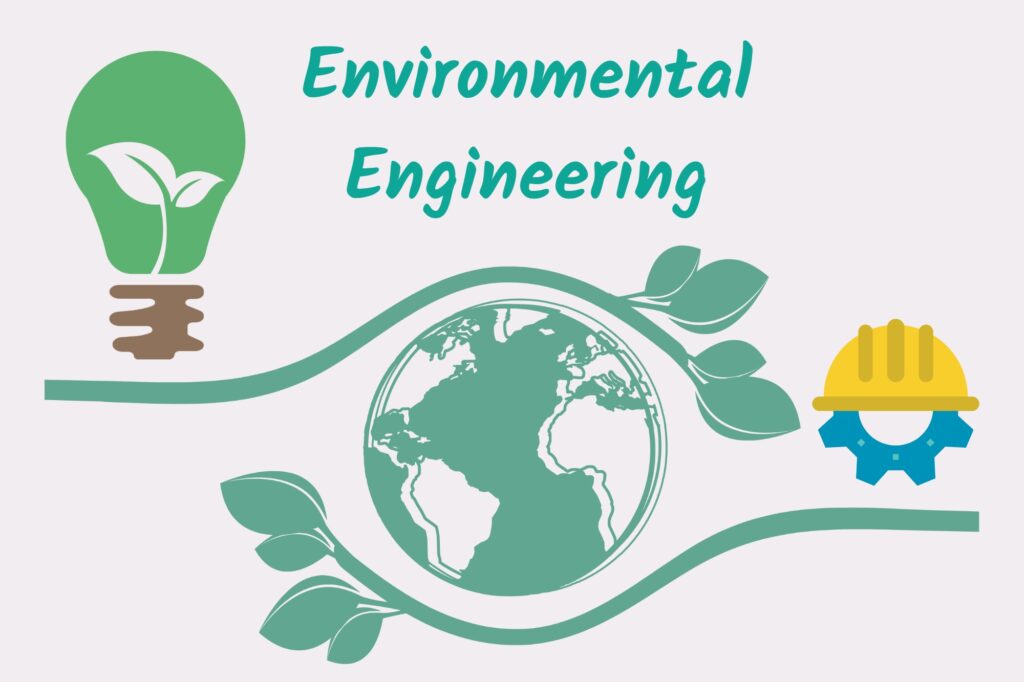Environmental Engineering
Environmental engineering focuses on applying science and engineering principles to protect the environment from contamination and restore natural habitats. It combines aspects of civil, chemical, and environmental engineering to create a comprehensive approach to environmental protection.
Environmental engineering has become increasingly important with the growing awareness of global climate change. In this article, we’ll examine what environmental engineering entails, the educational requirements, and potential career paths.
Role of an Environmental Engineer
Environmental engineers design, develop, manage and assess projects that help mitigate pollution, clean up contaminated sites, protect ecosystems, and improve recycling and waste management. Environmental engineers often work with professionals to develop strategies that reduce the impact of manufacturing and construction on the environment.
- Environmental engineers use various scientific, engineering and mathematical models to design, develop and implement plans and strategies to solve environmental problems.
- They assess the environmental impact of proposed projects, develop strategies to minimize or mitigate the impact and evaluate the effectiveness of the strategies.
- They also advise governments and businesses on the best ways to protect the environment and public health.
- They use their expertise to develop solutions to environmental problems, waste management and disposal, and climate change.
- They also develop plans to protect ecosystems, manage natural resources, and reduce the impact of toxic substances on human health.
Environmental engineers must have a strong understanding of the laws, regulations and policies that govern environmental protection. They must be able to interpret complex data and apply their knowledge to solve practical problems. Environmental engineers must also stay up-to-date on the latest scientific and technological developments to effectively solve environmental problems.
Qualifications Needed to Become an Environmental Engineer
Environmental engineers should have engineering, environmental science, or geology degrees. Some employers may also require a Master’s degree in environmental engineering or a related field. Environmental engineering degrees focus on studying the environment, its problems, and the methods to address them. These degrees will typically cover air and water pollution, hazardous waste management, and environmental law. Students will also learn about water and wastewater treatment, ecological systems, and environmental sustainability.
Plus, you should understand mathematics, chemistry, physics, and biology well. In addition to a degree, you should have experience in the field. Many environmental engineering employers expect their environmental engineers to have at least two years of relevant experience. You should be able to explain complex concepts clearly and concisely and build relationships with stakeholders.
Specialized Fields within Environmental Engineering
Within this field, there are several specialized areas. Some of these include-
- Air quality engineering focuses on studying air pollutants and their sources and effects. This includes the development and implementation of strategies to reduce air pollution, as well as the monitoring and assessment of air quality.
- Water resources engineering looks at the impacts of water resources on the environment and how to manage them. This includes developing and implementing strategies to manage and protect water resources, as well as monitoring and assessing water quality.
- Environmental health engineering focuses on studying the health risks posed by environmental pollutants and assessing those risks. This includes the development of strategies to reduce the health risks posed by environmental pollutants, as well as assessing health risks.
- Environmental toxicology focuses on the study of the effects of toxins on the environment and the assessment of those effects. This includes developing and implementing strategies to reduce the impacts of toxins on the environment, as well as monitoring and assessing the impacts of toxins.
- Environmental chemistry studies the chemical composition of the environment and the assessment of those compositions. This includes the development of strategies to reduce the impacts of chemicals on the environment, as well as monitoring and assessing the impact of chemicals on the environment.
Job Outlook of Environmental Engineering
Environmental engineers are in high demand due to increasing awareness of our environmental impact. More and more businesses understand the need to reduce their environmental footprint, and environmental engineers are the people to help them do that. As per the Bureau of Labor Statistics, the job outlook for environmental engineers is expected to grow by 8% between 2018 and 2028, which is faster than average for all occupations. With the increasing demand for environmental engineers, salaries are also expected to increase.
In addition to the traditional roles of environmental engineers, other career paths are becoming increasingly popular. For example, many environmental engineers are choosing to specialize in renewable energy, waste management, or water quality. With the increased focus on sustainability, these specialized roles are in high demand and can command higher salaries. Overall, environmental engineering is an exciting and rewarding career path.
Environmental Engineering Careers
Water Project Manager
Water project managers are an essential part of environmental engineering careers. They oversee the development and implementation of projects related to improving water quality, water treatment systems, and water supply systems. They must be familiar with regulations, laws, and other standards relevant to the project. Water project managers are in high demand, as the need for water-related projects is growing.
Environmental Engineer
Environmental engineers are responsible for designing and developing solutions to environmental issues. Senior environmental engineers are responsible for leading teams in developing and implementing these solutions. Senior environmental engineers must have strong technical knowledge and excellent problem-solving and communication skills.
They must be able to work with other professionals, such as engineers, chemists, and geologists, to develop solutions to environmental problems. They must also know environmental regulations and be able to manage projects effectively. In addition to technical knowledge, they must also have a working knowledge of environmental regulations and experience managing projects.
Environmental Health and Safety Director
Environmental Health and Safety Directors are responsible for overseeing and implementing environmental management, health and safety policies, plans, and programs. They are responsible for ensuring the organization’s environmental and safety protocols are followed. The responsibilities of an Environmental Health and Safety Director include:
- Coordinating and monitoring health and safety programs.
- Developing safety procedures.
- Investigating and resolving safety incidents.
They also ensure that the organization complies with all environmental regulations and laws. In addition, they coordinate with other departments to develop and implement health and safety plans and conduct risk assessments. They must also have a strong understanding of environmental laws and regulations.
Environmental Engineering Consultant
Environmental engineering consultants work with companies, organizations, and government agencies to assess the environmental impacts of their operations, identify solutions to environmental problems, and develop strategies for reducing the amount of pollution and waste generated. They are responsible for analyzing existing environmental conditions, conducting research, and creating reports and plans. They must also be familiar with environmental engineering principles, such as water quality, waste management, and air pollution.
Green Building Engineer
Green building engineers are responsible for designing structures and systems that are environmentally friendly and sustainable. They must consider the use of renewable resources, such as solar or wind energy, and consider the impact of building materials on the environment. Green building engineers must also be able to work with architects, civil engineers, and contractors to ensure that their designs meet the project’s requirements. To become a green building engineer, you need a bachelor’s degree in environmental engineering. You will also need to understand green building concepts, including energy efficiency, the use of renewable energy, and sustainable building techniques. Additionally, experience in the construction industry can be beneficial.
Where Does an Environmental Engineer Work?
Environmental engineers work in diverse areas, from private industry to government agencies. A company may employ them to help them comply with environmental regulations or improve their environmental practices. They may also work in government agencies, such as the Environmental Protection Agency or the Department of Energy, to help develop and enforce policies and regulations that protect the environment. Environmental engineers may also work in private consulting firms, providing advice and services to various clients.
Some may work in universities’ engineering or research departments, researching new technologies and practices that can help reduce environmental impacts. Environmental engineers may also be involved in research and development for new technologies, such as renewable energy sources or more efficient ways to manage wastewater. They may also be involved in disaster relief and emergency services, helping to assess and clean up sites affected by natural disasters or other environmental catastrophes.
Degrees in Environmental Engineering
B.Tech in Environmental Engineering
B.Tech in Environmental Engineering is a four-year undergraduate program that provides students with the knowledge and skills to design and implement solutions to environmental problems. The program covers air and water pollution control, waste management, environmental impact assessment, and sustainable development. Students learn about the various environmental laws and regulations that govern the industry and the latest technologies and techniques for monitoring and controlling pollution. They also gain practical experience through laboratory experiments, field trips, and internships with leading environmental organizations.
M.Tech in Environmental Engineering
This postgraduate program focuses on applying engineering principles to the preservation and protection of the environment.
Top colleges for Environmental Engineering Courses in India
IIT Delhi– program’s curriculum includes courses on environmental impact assessment, air and water pollution control, and solid waste management. The faculty is highly experienced and well-known in the field of environmental engineering. The program also offers research opportunities in renewable energy and sustainable development.
Delhi Technological University– The program focuses on providing students with a strong foundation in environmental engineering principles and practices. The curriculum includes environmental chemistry, microbiology, and environmental biotechnology courses. The university also has a well-equipped laboratory for conducting research in environmental engineering.
NIT Trichy is a highly respected institution that offers M.Tech in Environmental Engineering. The program’s curriculum includes courses on environmental impact assessment, environmental modeling, and environmental management systems. The faculty is highly experienced and well-known in the field of environmental engineering. The program also offers research opportunities in climate change and sustainable development.
Other Institutions
- Indian Institute of Technology (IIT), Kanpur
- Indian Institute of Technology (IIT), Bombay
- Indian Institute of Technology (IIT), Kharagpur
- Indian Institute of Technology (IIT), Madras
- College of Engineering (Anna University), Chennai
Benefits of Working in Environmental Engineering
Environmental engineering provides many benefits, from physical and environmental benefits to potential career opportunities and salary.
- Environmental Stewardship: As an environmental engineer, you will be responsible for helping to protect and restore our natural environment. This can include creating and implementing plans to reduce waste, improve water and air quality, and reduce the impact of human activities on the environment.
- Career Opportunities: Environmental engineering offers a wide array of career opportunities. You can work in government organizations, private companies, universities, or nonprofits. This field is booming, and the demand for environmental engineers is increasing yearly.
- Salary Potential: The salary potential for environmental engineers is high. With experience, you can make a six-figure salary much higher than the average salary for other fields. In addition, many environmental engineering jobs offer great benefits, such as health and dental insurance, retirement plans, and paid vacations.
- Education: Environmental engineering requires a great deal of education. Many employers prefer a master’s degree; you will be well-educated and highly marketable, which can open up more career opportunities.
Environmental engineering is a fascinating field that combines engineering and science to protect the environment. It is an ever-growing field that offers a variety of career opportunities. These careers will likely become more important in the coming years as global climate change and environmental degradation become increasingly important issues.



